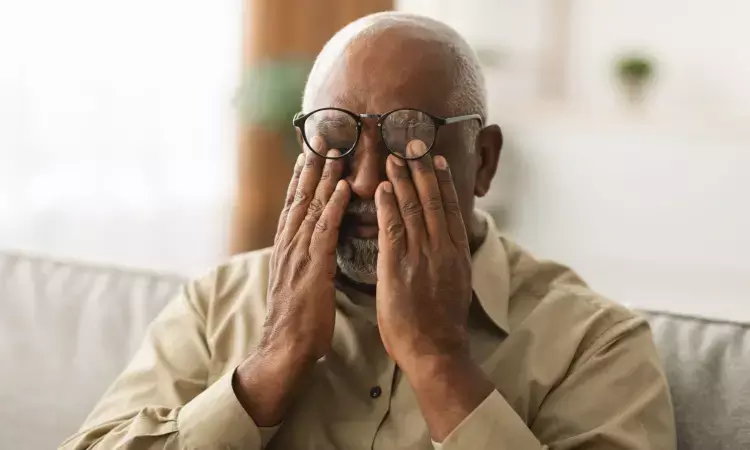- Home
- Medical news & Guidelines
- Anesthesiology
- Cardiology and CTVS
- Critical Care
- Dentistry
- Dermatology
- Diabetes and Endocrinology
- ENT
- Gastroenterology
- Medicine
- Nephrology
- Neurology
- Obstretics-Gynaecology
- Oncology
- Ophthalmology
- Orthopaedics
- Pediatrics-Neonatology
- Psychiatry
- Pulmonology
- Radiology
- Surgery
- Urology
- Laboratory Medicine
- Diet
- Nursing
- Paramedical
- Physiotherapy
- Health news
- Fact Check
- Bone Health Fact Check
- Brain Health Fact Check
- Cancer Related Fact Check
- Child Care Fact Check
- Dental and oral health fact check
- Diabetes and metabolic health fact check
- Diet and Nutrition Fact Check
- Eye and ENT Care Fact Check
- Fitness fact check
- Gut health fact check
- Heart health fact check
- Kidney health fact check
- Medical education fact check
- Men's health fact check
- Respiratory fact check
- Skin and hair care fact check
- Vaccine and Immunization fact check
- Women's health fact check
- AYUSH
- State News
- Andaman and Nicobar Islands
- Andhra Pradesh
- Arunachal Pradesh
- Assam
- Bihar
- Chandigarh
- Chattisgarh
- Dadra and Nagar Haveli
- Daman and Diu
- Delhi
- Goa
- Gujarat
- Haryana
- Himachal Pradesh
- Jammu & Kashmir
- Jharkhand
- Karnataka
- Kerala
- Ladakh
- Lakshadweep
- Madhya Pradesh
- Maharashtra
- Manipur
- Meghalaya
- Mizoram
- Nagaland
- Odisha
- Puducherry
- Punjab
- Rajasthan
- Sikkim
- Tamil Nadu
- Telangana
- Tripura
- Uttar Pradesh
- Uttrakhand
- West Bengal
- Medical Education
- Industry
Twice-daily Pilocarpine hydrochloride ok for improving near-visual acuity in presbyopia: Study

USA: Pilocarpine hydrochloride 1.25% administered twice daily in people with presbyopia led to more significant improvements in near-visual acuity at day 14 without compromising distance acuity, a phase 3 study has shown.
The safety profile was consistent with the once-daily administration of pilocarpine hydrochloride 1.25%, headache being the most common treatment-emergent adverse event, and systemic accumulation was minimal, supporting twice-daily administration. Pilocarpine is a muscarinic receptor agonist that mimics the actions of the parasympathetic neurotransmitter acetylcholine on smooth muscles to boost near vision.
The study, featured in the American Journal of Ophthalmology, led to the FDA approval of the twice-daily use of pilocarpine hydrochloride 1.25% eye drops for presbyopia treatment in March 2023.
Presbyopia is characterized by a progressive decline in near vision that becomes noticeable at age ≥40 and is due to age-related changes in the crystalline lens. Surgical and nonsurgical methods can correct presbyopia. Nonsurgical procedures include bifocal or varifocal glasses, reading glasses, and monovision or multifocal contact lenses. However, these methods can reduce visual acuity at one or more viewing distances (distance, intermediate, and near) and are linked with potential risks, complications, and inconveniences.
Against the above background, Shane Kannarr, Kannarr Eye Care, Pittsburg, Kansas, USA, and colleagues aimed to evaluate the efficacy, safety and pharmacokinetics of 1.25% pilocarpine hydrochloride (Pilo) compared with a vehicle when administered bilaterally, twice daily (BID, 6 hours apart) for 14 days in presbyopia patients.
The study included 230 participants aged 40-55 with presbyopia impacting daily activities with mesopic, high-contrast, binocular distance-corrected near visual acuity (DCNVA) of 20/40 to 20/100. One hundred fourteen were randomized to Pilo BID and 116 to vehicle.
Percentage of participants gaining ≥3 lines in mesopic/photopic, high-contrast, binocular DCNVA on Day 14, Hour 9, with no more than 5-letter loss in photopic/mesopic corrected distance visual acuity with the same refractive correction (primary endpoint). Pilocarpine plasma levels were assessed in about 10% of enrolled participants. TEAEs (treatment-emergent adverse events) and some ocular measurements were essential safety measures.
The authors reported the following findings:
- The proportion of participants achieving the primary and critical secondary efficacy endpoints was statistically significantly more significant with Pilo BID than with vehicle, with between-treatment differences of 27.3% and 26.4%, respectively.
- The most common TEAE was a headache, reported in 10 (8.8%, Pilo group) and 4 (3.4%, vehicle group) participants.
- Pilocarpine's accumulation index on Day 14 was ≤1.11 after the second dose.
"Near-vision improvements were statistically greater with Pilo BID than the vehicle, without compromising distance acuity," the researchers concluded. "The safety profile of Pilo BID was consistent with that of Pilo once daily, and systemic accumulation was minimal, supporting BID administration."
Reference:
Kannarr S, El-Harazi SM, Moshirfar M, Lievens C, Kim JL, Peace JH, Safyan E, Liu H, Zheng S, Robinson MR. SAFETY AND EFFICACY OF TWICE-DAILY PILOCARPINE HCL IN PRESBYOPIA: THE VIRGO PHASE 3, RANDOMIZED, DOUBLE-MASKED, CONTROLLED STUDY. Am J Ophthalmol. 2023 May 4:S0002-9394(23)00195-2. doi: 10.1016/j.ajo.2023.05.008. Epub ahead of print. PMID: 37149245.
Dr Kamal Kant Kohli-MBBS, DTCD- a chest specialist with more than 30 years of practice and a flair for writing clinical articles, Dr Kamal Kant Kohli joined Medical Dialogues as a Chief Editor of Medical News. Besides writing articles, as an editor, he proofreads and verifies all the medical content published on Medical Dialogues including those coming from journals, studies,medical conferences,guidelines etc. Email: drkohli@medicaldialogues.in. Contact no. 011-43720751


